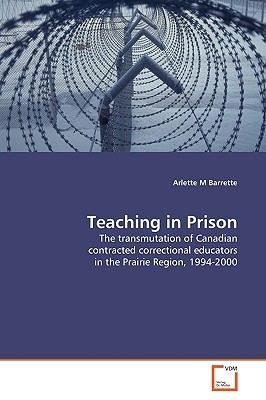
- We will send in 10–14 business days.
- Author: Arlette M Barrette
- Publisher: VDM Verlag
- ISBN-10: 3639036271
- ISBN-13: 9783639036275
- Format: 15.2 x 22.9 x 1.6 cm, minkšti viršeliai
- Language: English
- SAVE -10% with code: EXTRA
Reviews
Description
In Canada, correctional education in federal penitentiaries was privatized in 1987. Since then, educators enter the prison settings and work by prison rules to fulfill the mandate of the Correctional Service of Canada's education policy as contracted correctional educators (CCEs). The corporate and institutionally assumed explanation for the CCEs'retention is prisonization. This study explores the professional reality of the CCEs of the Prairie region (Alberta, Saskatchewan, Manitoba) during the period of September 1994 and 2000 and challenges the various theses concerning resocialization and, because of the "impossibility of prisonization" looks at the dialogical strategies (dezoning and disowning) for personal resistance and identity mutation. The thesis concludes with recommendations for enhancing the potential for abolitionism through dialogical reflexivity and encourages CCEs to actively organize to reverse the marginalization created by bureaucratic domination and corporate privatization and to work to counteract workplace violence and advocating for state and social rectification of the failures of correctional education.
EXTRA 10 % discount with code: EXTRA
The promotion ends in 23d.14:51:52
The discount code is valid when purchasing from 10 €. Discounts do not stack.
- Author: Arlette M Barrette
- Publisher: VDM Verlag
- ISBN-10: 3639036271
- ISBN-13: 9783639036275
- Format: 15.2 x 22.9 x 1.6 cm, minkšti viršeliai
- Language: English English
In Canada, correctional education in federal penitentiaries was privatized in 1987. Since then, educators enter the prison settings and work by prison rules to fulfill the mandate of the Correctional Service of Canada's education policy as contracted correctional educators (CCEs). The corporate and institutionally assumed explanation for the CCEs'retention is prisonization. This study explores the professional reality of the CCEs of the Prairie region (Alberta, Saskatchewan, Manitoba) during the period of September 1994 and 2000 and challenges the various theses concerning resocialization and, because of the "impossibility of prisonization" looks at the dialogical strategies (dezoning and disowning) for personal resistance and identity mutation. The thesis concludes with recommendations for enhancing the potential for abolitionism through dialogical reflexivity and encourages CCEs to actively organize to reverse the marginalization created by bureaucratic domination and corporate privatization and to work to counteract workplace violence and advocating for state and social rectification of the failures of correctional education.


Reviews